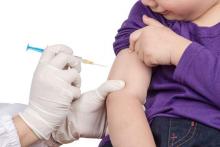A quadrivalent human papillomavirus vaccine provided adequate seroconversion response rates in immunocompromised children, according to Dr. C. Raina MacIntyre, MBBS, PhD, and her associates.
In a clinical trial of 59 immunocompromised children aged 5-18, seroconversion rates for HPV types 6, 11, 16, and 18 were 93.3%, 100%, 100%, and 88.9%, respectively, 7 months after receiving the first dose of vaccine. After 2 years, seroconversion rates for HPV types 6, 11, 16, and 18 were 82.2%, 91.1%, 91.1%, and 68.9%, respectively.
Local adverse events occurred in 16 patients after the first dose, but incidence decreased after the second and third doses. Injection site erythema, pain, and swelling were the most commonly reported adverse events. Minor disease flare occurred in two patients during the follow-up period, and one patient developed a squamous cell oral carcinoma, but the tumor could not be tested for HPV.
The data suggest “that HPV vaccine could be given earlier for immunosuppressed children, who are at higher risk of earlier onset cancers, but long-term follow-up studies are required to determine persistence of immunity,” the investigators said.
Find the full study in Vaccine (doi: 10.1016/j.vaccine.2016.06.049).


